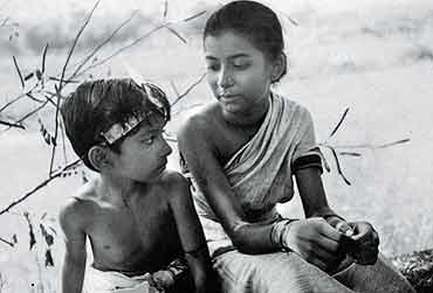The other characters in Apu's life, besides Durga, include his overstressed mother Sarbajaya (Karuna Bannerjee), his dreamily optimistic father Harihar (Kanu Bannerjee), and their decrepit but feisty aunt (Chunibala Devi). Pather Panchali is largely plotless, but the structure of the film finds the family struggling to support themselves. The father takes sporadic work as a priest while the mother tends to Apu and Durga and quarrels with the itinerant aunt. Their livelihoods have been on a downward trajectory since before Apu was born, as they used to be landowners but have had to sell more and more property and possessions while Harihar goes without income. Away from the financial pressures, Durga is watching her more well-off friends think about marriage, something worryingly unlikely for her due to her family's inability to pay a good dowry, and Apu adjusts to school.
The magic of Pather Panchali exists outside of action, but in moments of well-observed childhood that take place in a specific milieu but could also be any family anywhere. Whether it's doodling in class during a lecture, sneaking treats from one's mother's hiding place, or being momentarily inspired by an adult that loves their job, Ray has a sense of how any kid anywhere, Indian or not, wealthy or poor, is living day to day. The cultural accoutrements of cuisine or religion fade away against the viewer remembering a similar scenario from their youth. The specificity of Indian life resonates most strongly with the marriage plots, and the family shame that comes from potentially having to accept charity from their neighbors. As this film was primarily for an Indian audience, it's left up to the viewer to decipher what is most valued in the small community, and the basic emotions and goals are plain enough that they are easily deciphered.
With a cast and crew composed of mostly amateurs, it would be reasonable to assume that the finished product would look amateurish. However, that is most certainly not the case. Each of the five main actors get their standout moments, and each succeeds in adding a deep layer of humanization when called upon. It's always difficult to parse a foreign language film for a bad reading or a hacky line, but even with that caveat, Ray manages to make his film feel thoroughly naturalistic. Novice cinematographer Subrata Mitra composes breathtaking shots worthy of a Malick film, and the film is guided by novice Ray's steady hand on the till. The man with the most experience in his field, composer of the score Ravi Shankar, keeps the proceedings going with his atmospheric sitar music. It's incredible to learn that this was the first film for so many people. Per George Costanza rules for leaving on a high note, if all involved had packed it in after knocking their first attempt out of the park, they would have been justified.
Pather Panchali feels a tiny bit overlong, but it stands amongst the great coming-of-age stories, and it has the added benefit of only being part one in a trilogy. Like Francois Truffaut's Antoine Doinel, the major stages of Apu Roy's life are onscreen in a perceptive, empathetic troika, or at least the first entry is. The next two are eagerly awaited. A-

 RSS Feed
RSS Feed